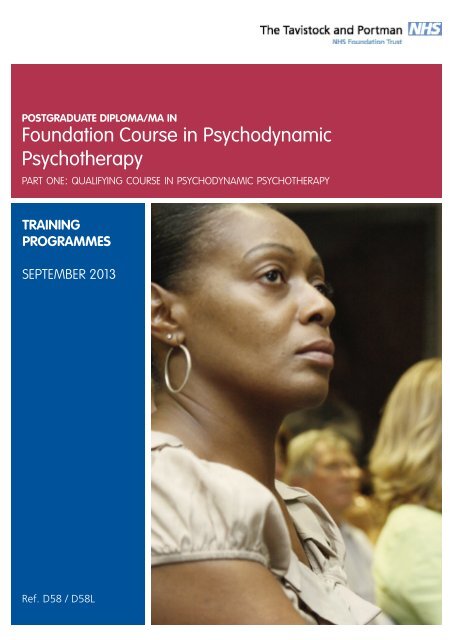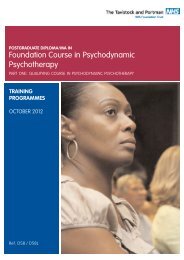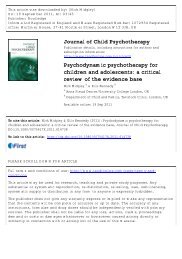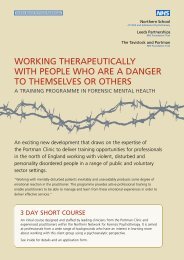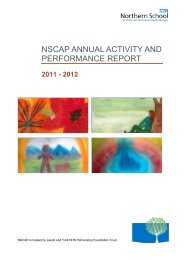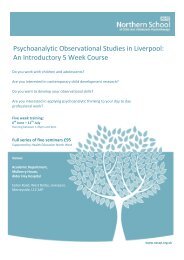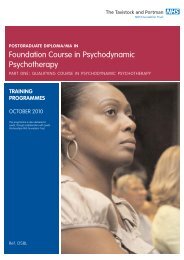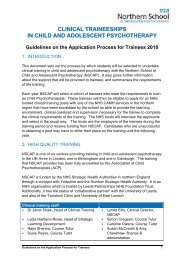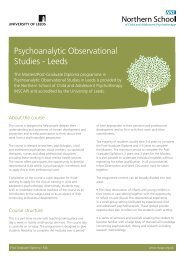D58 Course Outline_2013.pdf - Tavistock and Portman
D58 Course Outline_2013.pdf - Tavistock and Portman
D58 Course Outline_2013.pdf - Tavistock and Portman
Create successful ePaper yourself
Turn your PDF publications into a flip-book with our unique Google optimized e-Paper software.
POSTGRADUATE DIPLOMA/MA INFoundation <strong>Course</strong> in PsychodynamicPsychotherapyPART ONE: QUALIFYING COURSE IN PSYCHODYNAMIC PSYCHOTHERAPYTRAININGPROGRAMMESSEPTEMBER 2013Ref. <strong>D58</strong> / <strong>D58</strong>L
This is a well-established foundation course inPsychodynamic Psychotherapy which presents animportant opportunity for professionals in thehealth service, statutory <strong>and</strong> voluntary sectors togain an initial training in psychodynamicpsychotherapy.It is important to apply as early as possible, ascertain requirements need to be in place beforeyou begin the course.These include being in personal psychotherapywith a BPC registered psychoanalyticpsychotherapist.We will be pleased to discuss this with you atinterview <strong>and</strong> help you find a suitable vacancy.This course is offered in London <strong>and</strong> Leeds.AimsThe primary aim of the course is to introduce a widevariety of students to a psychoanalytic way of thinkingabout their clinical work. It is expected that in mostinstances, course participants will wish to remain workingwithin their core professions <strong>and</strong> the course will equipthem with a new dimension in their capacities to reflectupon that work.This course also provides students with an opportunity toexplore whether they may wish to pursue further trainingin psychoanalytic psychotherapy.In the contemporary NHS, many of the most vulnerable<strong>and</strong> deprived patients are from black <strong>and</strong> ethnic minoritycommunities. Staff working in NHS <strong>and</strong> public sectorsettings are drawn from a wide range of racial <strong>and</strong> culturalcommunities. We therefore consider it essential that theinter-cultural dimension in psychotherapy is given properattention.Inter-cultural psychotherapy is represented in the lectureprogramme <strong>and</strong> cultural issues will be fully considered insupervision <strong>and</strong> in the clinical seminars.Recognition <strong>and</strong> QualificationsStudents who remain registered for the course <strong>and</strong> whosuccessfully complete the requirements are eligible foreither a Postgraduate Diploma (after two years) or an MA(after three years), awarded by the University of Essex,through the Centre for Psychoanalytic Studies.The Centre for Psychoanalytic Studies at the University ofEssex runs a variety of programmes, including individualcourses, one year postgraduate certificates, MA schemes<strong>and</strong> doctoral programmes by research or doctoralprogramme. Information about the Centre forPsychoanalytic Studies is available onwww.essex.ac.uk/centres/psychoThe course comprises Part 1 of a qualifying course inPsychodynamic Psychotherapy accredited by the BritishPsychoanalytic Council. Students who successfullycomplete the first two years of this course are eligible toapply for Part 2 of the Qualifying <strong>Course</strong>, InterculturalPsychodynamic Psychotherapy (D59). Please note Part 2 isonly accredited by the BPC.Entrance RequirementsStudents have different levels of clinical experience. Somemay already be familiar with psychoanalytic concepts whileothers are quite new to the field. Applicants shouldnormally have a good honours degree in addition to theirprofessional qualification. Applicants not yet ready toundertake the foundation course may be eligible for anintroductory programme.This course is offered in partnership with the University of Essex
A. ProfessionalApplicants are invited from the disciplines of psychology,social work <strong>and</strong> medicine, (both from general practice<strong>and</strong> psychiatry), as well as those working as nurses,probation officers, art therapists <strong>and</strong> workers from thevoluntary sector.Applicants are generally, expected to be working within acore profession in the NHS or related organisations.Students should be in a position to treat at least onepatient in once-weekly psychotherapy for two years.Occasionally an applicant may not have an appropriateclinical setting within which the work for this course canbe conducted. Under these circumstances, the applicant isadvised to discuss this situation well in advance with thecourse staff, so that we may be able to consider how tohelp find an alternative suitable setting in which to see apatient.B. PersonalApplicants are required to be in a minimum ofonce-weekly personal psychoanalytic psychotherapy, witha psychoanalytic psychotherapist or psychoanalystregistered with the British Psychoanalytic Council topractice with adults. Personal psychotherapy is a corecomponent of the student’s personal <strong>and</strong> professionaldevelopment. Therefore, more intensive personalpsychotherapy or psychoanalysis is recommended as thisenhances the student’s learning experience.Students who have not already embarked on personalpsychotherapy are advised to discuss this issue well inadvance with the course organiser so that a suitablepsychotherapy vacancy can be found.C. InterviewsPersonal interviews take place from January onwards priorto the autumn term intake. Early application is advised.Applications are accepted on the basis of the applicationform, interview <strong>and</strong> references.<strong>Course</strong> StructureYears 1 <strong>and</strong> 2The core component of the course is the supervisedtreatment of an adult patient in once weeklypsychodynamic psychotherapy in a suitable NHSpsychotherapy setting for a period of two years. Thetaught components take place weekly on a Wednesdayover three academic terms of Year 1 <strong>and</strong> 2, with a fixedprogramme of lectures <strong>and</strong> seminars between 11.15 to4.45pm (it may be possible to begin at 12.30 <strong>and</strong> finishat 6.30).Although the taught part of the course takes place on oneday, Wednesday, it may not always be possible for all thecourserequirements to be completed in this one day. Studentsshould be prepared to find time on other days to attendtheir own personal psychotherapy, to see their patient orto attend meetings in their clinical placement (if this is nottheir usual work setting). Students will also be expected tosee their patients <strong>and</strong> attend their own therapy outsideacademic term times.A. SupervisionSupervision groups take place weekly for 1¼ hours overthree terms each year. A maximum of three students meetwith the same supervisor to discuss their clinical material indetail, on a rotational basis. Supervisors are all experiencedclinicians in psychotherapy. The course fee covers the costof supervisions over the two-year programme. Thesupervision task is to look at the detail of the individualcases from a psychoanalytic view, <strong>and</strong> to advise onmanagement issues as they arise.B. Clinical SeminarWeekly clinical seminars last for 1¼ hours, for three termsper year. They have a membership of up to twelvestudents <strong>and</strong> are conducted by an experienced seminarleader, who continues with the group for one year. Eachstudent in turn presents their clinical work, <strong>and</strong> thematerial is used to develop a wider clinical discussion thanwill be possible in the supervision setting.C. Theory SeminarsA series of theory seminars is provided throughout the firsttwo years. These are presented to the whole year group,usually 20 - 25 students, by a number of differentlecturers, addressing a wide range of topics. The style <strong>and</strong>format of the seminars varies depending on the subject<strong>and</strong> individual style of each seminar leader; some are morestructured <strong>and</strong> didactic, others approximate more to adiscussion or a reading seminar.Major basic concepts in psychotherapy <strong>and</strong> psychoanalysisare covered, <strong>and</strong> reading lists are provided in advancewith online access for many texts. It is expected that allstudents read at least the required reading for theoryseminars <strong>and</strong> time needs to be allowed for this outside thecourse schedule.D. WorkshopsIn addition to lectures students are expected to attendlunchtime workshops three times each term. Theseworkshops cover a variety of issues such as ethics, riskassessment <strong>and</strong> clinical skills. They are less formal <strong>and</strong>more interactive than lectures <strong>and</strong> are led by a number ofdifferent staff. Workshops may vary on the Leeds course<strong>and</strong> students should check details with Leeds staff.All seminars, workshops <strong>and</strong> supervision groups arecompulsory. One hundred percent attendance is expected.
Tutorial ArrangementsEach student has a personal tutor whom they will meet forat least one tutorial per term in Years 1 <strong>and</strong> 2. The tutor,together with the organising tutor if necessary, is availableto discuss issues relating to the course, including thestudent’s progress, academic work <strong>and</strong> any relevantpersonal issues including career development.Year 3The third year is for those students wishing to submit adissertation for an MA <strong>and</strong> has less formal teaching. In thefirst term there are 4 seminars on writing a dissertation. Inthe second term the student works on the dissertation <strong>and</strong>will have meetings with their dissertation supervisor. Thedissertation is due for submission at the beginning of thethird term.In addition some students may need to continue with afurther term (occasionally two terms) in the supervisiongroup to complete the clinical requirement of at least fiveterms of supervised work with their patient. This can beundertaken concurrently with work on the dissertation.The cost of supervision groups in the third year is notcovered by the course fee <strong>and</strong> an additional charge willtherefore be made.Written RequirementsThree written assignments (approx 5000 words each)based on the three components of the course aresubmitted in the third term of both Years 1 <strong>and</strong> 2. Thedissertation (10,000 to 15,000 words) is submitted in thethird term of Year 3.Progression Through the <strong>Course</strong>Year 1Applications are processed by the Directorate of Training<strong>and</strong> Postgraduate Education who can also respond to anyinitial enquiries on 020 8938 2314 or (for Leeds course)through contact with Susie Godsil on 0113 265 7169.Applications are submitted to the <strong>Course</strong> Director whodecides whether an interview will be offered on the basisof the information provided in the application form.Preliminary discussion with an applicant is sometimesnecessary, in which case the <strong>Course</strong> Director will contactthe applicant.Interviews are arranged with individual members of thecourse team, <strong>and</strong> take place from January onwards, priorto the autumn intake.Year 2Entry to the second year is dependent on the assessmentof the student’s performance in Year One.Year 3Entry to the third year is dependent on the assessment ofthe student’s performance in Year 2.From time to time, students will experience a delay instarting with a patient. This may be for a variety ofreasons, including the student's readiness <strong>and</strong> theavailability of suitable patients. Where a delay occurs,students will need to take more time to complete theclinical requirement. This will entail the student paying foradditional supervision in the third year.If there is a delay in starting with a patient, the studentmay be allowed to bring clinical experience from his/herown work place to the supervision group. However, thiswill not count towards the clinical psychotherapyexperience required by the course.London Staff<strong>Course</strong> DirectorMarilyn Lawrence<strong>Course</strong> Organising TutorElizabeth Coates ThummelUniversity Link TutorDavid MillarSeminar LeadersOrna HadaryMarcus EvansGideon HadarySusannah Ginsberg-TafflerSupervisorsMichael HaltonSusan PhillipsHiroshi AminoKannen NavaratnemGordana BatincaJulian LousadaOrna HadaryMonica LanmanS<strong>and</strong>ra LinfordMary BradburyKatya GolynkinaMike SwinburneAlan ColamFlavia MoranteCarlos TammLesley SteynLecturersNeil MorganIain OswaldNaomi ShavitJoanne StubleyJulian LousadaJudith EdwardsSusan Stuart-SmithDavid MillarCarolyn WalkerMichael HaltonBernard RobertsOrna HadaryMaria EyresFakhry DavidsElisa Reyes SimpsonAlan ColamMary Bradbury.
Leeds Staff<strong>Course</strong> DirectorMarilyn Lawrence<strong>Course</strong> Organising TutorSusan GodsilLeeds Link TutorSue Stuart SmithUniversity Link TutorDavid MillarClinical Seminar LeadersJames JohnstonNicola ChaddSupervisorsDick AgassSusanna BaileyWalter GibsonSusie GodsilGraham InghamLecturersDick AgassNicola ChaddJean DixGearoid FitzgeraldWalter GibsonKay GoddardSusie GodsilJames JohnstonAlison KnightsExternal ExaminerJenny CobbLeeds Administrator:Amy CrawshawTel: 0113 305 8750Email: amy.crawshaw@nhs.netResourcesA programme of lectures <strong>and</strong> reading lists are provided atthe outset. In addition to the programme of eventsdesigned for this course students have access to thefollowing extra resources:LibraryStudents will have computer access to the <strong>Tavistock</strong> Library<strong>and</strong> its services.The training, teaching, research <strong>and</strong> clinicalwork of the <strong>Tavistock</strong> Clinic is supported by the servicesprovided by the <strong>Tavistock</strong> Library. The Library is open tomembers every day <strong>and</strong> during some evenings on aregular basis. The Library staff are available to assistreaders <strong>and</strong> to help with individual searches ondissertation topics.The Leeds course takes place in the Northern School ofChild <strong>and</strong> Adolescent Psychotherapy(http://www.nscap.org.uk/). There is an excellent library onthe premises for students' use with a wide selection ofpsychoanalytic texts. Photocopying facilities for students'purposes are also available in this library <strong>and</strong> computerslinked to the <strong>Tavistock</strong> Library system.Administrative SupportDepartment of Education <strong>and</strong> Training deals with allcourse enquiries, applications, references, fees, notificationof qualification <strong>and</strong> provides information on work permitsfor overseas students, etc. Photocopying facilities forstudents’ own purposes are available in the Library.Equal OpportunitiesThe <strong>Tavistock</strong> <strong>and</strong> <strong>Portman</strong> NHS Foundation Trust has anactive commitment to increasing the number of traineesfrom black <strong>and</strong> minority ethnic groups <strong>and</strong> suchapplications are welcomed.Other InformationIn addition to course fees, students will be responsible formeeting the costs of their own personal psychotherapywhich are agreed privately with their psychotherapist.FURTHER INFORMATION<strong>Course</strong> Administrator,Directorate of Education <strong>and</strong> Training,The <strong>Tavistock</strong> Centre, 120 Belsize Lane,London NW3 5BATel: 020 8938 2314Fax: 020 7447 3837Email: adultadmin@tavi-port.ac.ukwww.tavistock<strong>and</strong>portman.ac.uk


